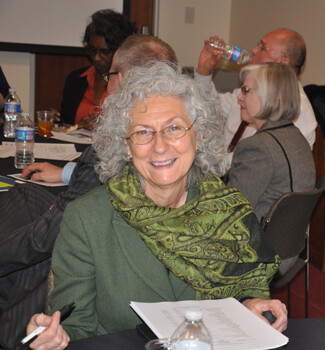
Connectional Table meets
 BY MELISSA LAUBER
BY MELISSA LAUBER
UMCONNECTION STAFF
Noting how well ministry and mission are being lived out in local churches and communities throughout the Baltimore-Washington Conference, leaders serving on the Connectional Table recently committed to rolling up their sleeves to work on building upon the many positive acts of discipleship being lived out throughout the region.
At the Feb. 16 meeting, members heard about the conference’s positive financial outlook based on faithful apportionment giving in 2010 that could result in an unprecedented reduction in the benevolence factor; voted on whether they concurred with legislation that will be coming before the May session of annual conference; and celebrated a number of ministry initiatives.
Addressing the conference’s efforts to end homelessness in this region, the Rev. David Argo announced plans, spearheaded by Foundry UMC, to build supporting housing for 79 homeless people in the soon-to-be renovated Calvary UMC in Washington.
Calvary UMC was closed in 2010. In its place, Calvary Place is rising, a planned apartment community, with supportive services and a new church start in the church’s original chapel, which seats 200 people.
Among other reasons for celebration, Bishop John Schol noted, were:
- The conference had an apportionment collection rate of 91.5 percent in 2010, making it possible for leaders to begin to project a decline in the benevolence factor for local churches from 19.5 in 2011 to 16 percent in 2017.
- A five-point plan has been launched to revive churches in Baltimore, which includes funding the appointment of four associate pastors to black United Methodist churches to enable them to address barriers to increasing worship attendance. (Two of these pastors will serve in Baltimore, one will be appointed to D.C. and one to a church in Prince George’s County.)
- The BWC is a leader in the denomination’s fight to eradicate malaria, contributing $500,000 in 2010 and pledging $1.5 million more by 2015.
- In this year’s appointment season, the conference is returning conference staff to the local churches, providing several “turnaround leaders” to pastor local churches.
- Plans are underway to create 20 new faith communities in this region in the next 10 years.
- A denomination-wide Call to Action will soon provide local churches with information and resources to help them grow in 16 areas that have been proven to create or increase congregational vitality.
“Things are going well,” said Schol, who called upon the members to build on these good things with a sense of “urgency and vigorous and positive action.”
The Connectional Table also voted on whether or not to endorse 12 resolutions submitted by individuals and churches that will considered by annual conference members when they meet May 26-28.
Connectional Table members are the elected members of conference boards, committees and commissions. Their concurrence or non-concurrence with a resolution is intended to be a guide for annual conference members as they consider how to vote.
Following a lively discussion, the members voted non-concurrence with four resolutions concerning homosexuality.
These included a resolution intended to go before the 2012 General Conference that would allow pastors the right to conduct same-sex unions, if they so choose, in civil jurisdictions where same-gender marriage or civil union are permitted.
Members also voted non-concurrence on a measure to prohibit pastors and churches from promoting homosexual unions.
A measure calling for a constitutional amendment to “give definitive guidance and clarification regarding ministry to the homosexual population,” was opposed, as was a petition asking that language characterizing homosexuality as “incompatible with Christian teaching” be removed from the Book of Discipline.
In the social justice arena, Connectional Table members concurred with resolutions to:
- end the United Methodist’s financial involvement in Israel ’s occupation of Palestine by divesting from companies that sustain occupation;
- support a petition being sent to the 2012 General Conference calling of the continuation of Peace with Justice Sunday;
- strengthen the church’s witness to the disabled,
- speak out as a counter-voice against usurious practices, and use community banks that practice responsible consumer lending practices;
- back efforts that oppose immoral immigration laws in Maryland and provide resident immigrant youth with the ability to pay in-state tuition fees at state colleges and universities.
Members also voted to lend their support to the Wesley Nexus website, www.wesnex.org, which explored the relationship between faith and science.
They voted non-concurrence with a resolution that encourages every church in the conference to open its doors to children and teens for after school programs.
 In a detailed report on the budget, Conference Treasurer Paul Eichelberger reported during this year’s financial planning and review “God’s hand could be seen in the numbers.” Council on Finance and Administration members felt compelled to carry the positive momentum forward.
In a detailed report on the budget, Conference Treasurer Paul Eichelberger reported during this year’s financial planning and review “God’s hand could be seen in the numbers.” Council on Finance and Administration members felt compelled to carry the positive momentum forward.
In 2010, many churches paid their full apportionments, resulting in a 90.51 collection rate, up from 87.7 percent in 2007. This faithful giving enabled to conference to consider decreasing the benevolence factor in future years, Eichelberger said.
In 2012, CFA will be proposing an 18 percent benevolence factor, down from the 19.5 percent churches paid in 2011. The intention is to gradually reduce it to 16 percent over the next four to six years.
Currently, the average church pays about 12 percent to support connectional giving. With the proposed reductions, Eichelberger said, the conference hopes to reduce that to 10 percent, the same amount as the biblical tithe.
“The more money we are able to keep at the long church, the stronger our churches will be. We believe strongly that ministry is to be lived out the local church level,” said Eichelberger. “This is nothing but good news.”

Login/Register to leave comment